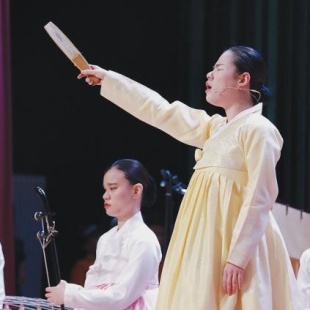Breaking barriers
Korean visually impaired orchestra links lives through music, Hou Chenchen reports.


Healing power
Being visually impaired, Choi also refers to himself as a "social worker for the blind", with his goal being to strive for equal social status for the visually impaired and helping them to heal through Korean traditional music.
In addition to promoting Korean traditional music, another mission of the Korean Traditional Music Orchestra of the Blind is to provide healing to the visually impaired and demonstrate their potential to excel as music specialists.
"I want our orchestra to bring happiness to sighted people and healing to those in pain," Choi said. "We aim to raise awareness about disabilities by showcasing the artistic spirit of visually impaired musicians."
Lee Hyun-a, a visually impaired Jeongga singer, is one of the orchestra's members. Jeongga is a traditional genre of Korean classical music known for its melodic beauty, emotional depth and poetic lyrics based on Confucian themes and values.
Lee first encountered Jeongga in the third grade. "I heard Jeongga playing on the radio, and its melodic and captivating sound caught my attention. That's when I developed an interest in this Korean traditional music," Lee said.
Her musical journey began when her piano teacher suggested that she explore the world of Jeongga. But the path for Lee has been challenging.

"Because I can't read music notes, I have to rely on recordings of melodies and instructions from my teacher, which I replay multiple times for practice," she said.
In vocal training, Lee faces another challenge: she physically touches her instructor's mouth to understand complex singing techniques and feels specific body movements to employ vocal methods effectively.
Also, to enhance her lung capacity for singing, Lee spends considerable time swimming.
"Swimming poses a greater challenge for me compared to others, as I need a teacher by my side for real-time guidance instead of observing others," she said.
Despite the numerous obstacles, Lee remains committed to her dream of performing traditional music.
"When I first heard Jeongga on the radio, it felt like a friend who could accompany me," she said.
"During moments of depression or when I feel like giving up, it provides spiritual comfort and support, serving as a profound source of healing."
"But no matter how difficult it may be, it will always be by my side, empowering me," Lee said of learning Korean traditional music.
She said that beyond the music itself, being part of the orchestra also brings healing to her.
"The people around me give me motivation," Lee said.
The orchestra's artistic director also transcribes musical scores into Braille to help visually impaired musicians familiarize themselves with the music, she said.
At the same time, he offers detailed guidance on vocal technique and provides thorough recommendations to each visually impaired musician.
"He (the director) provides tremendous help and encouragement to me and my teammates," Lee said. "I feel a sense of warmth within the orchestra."





































